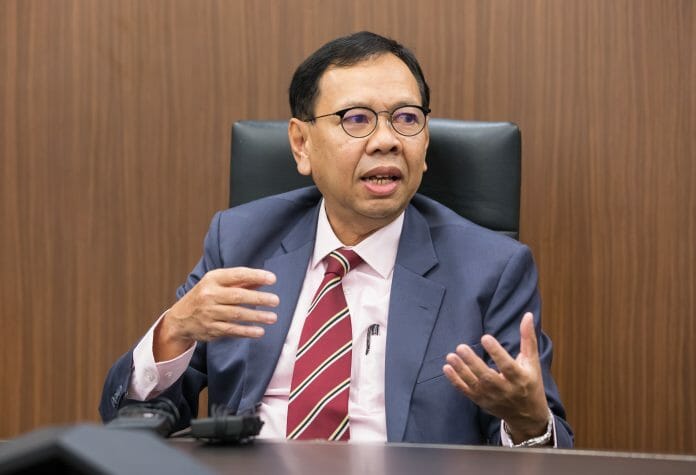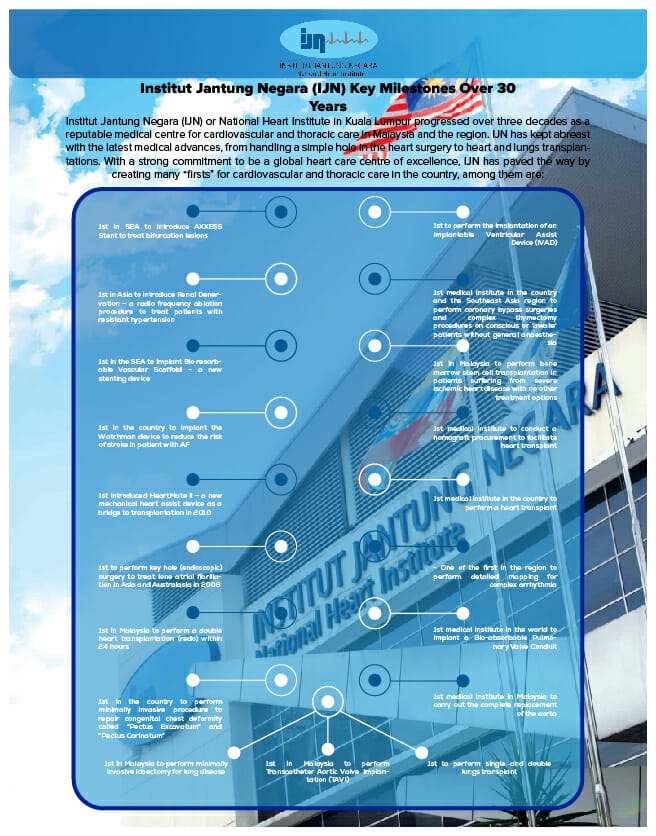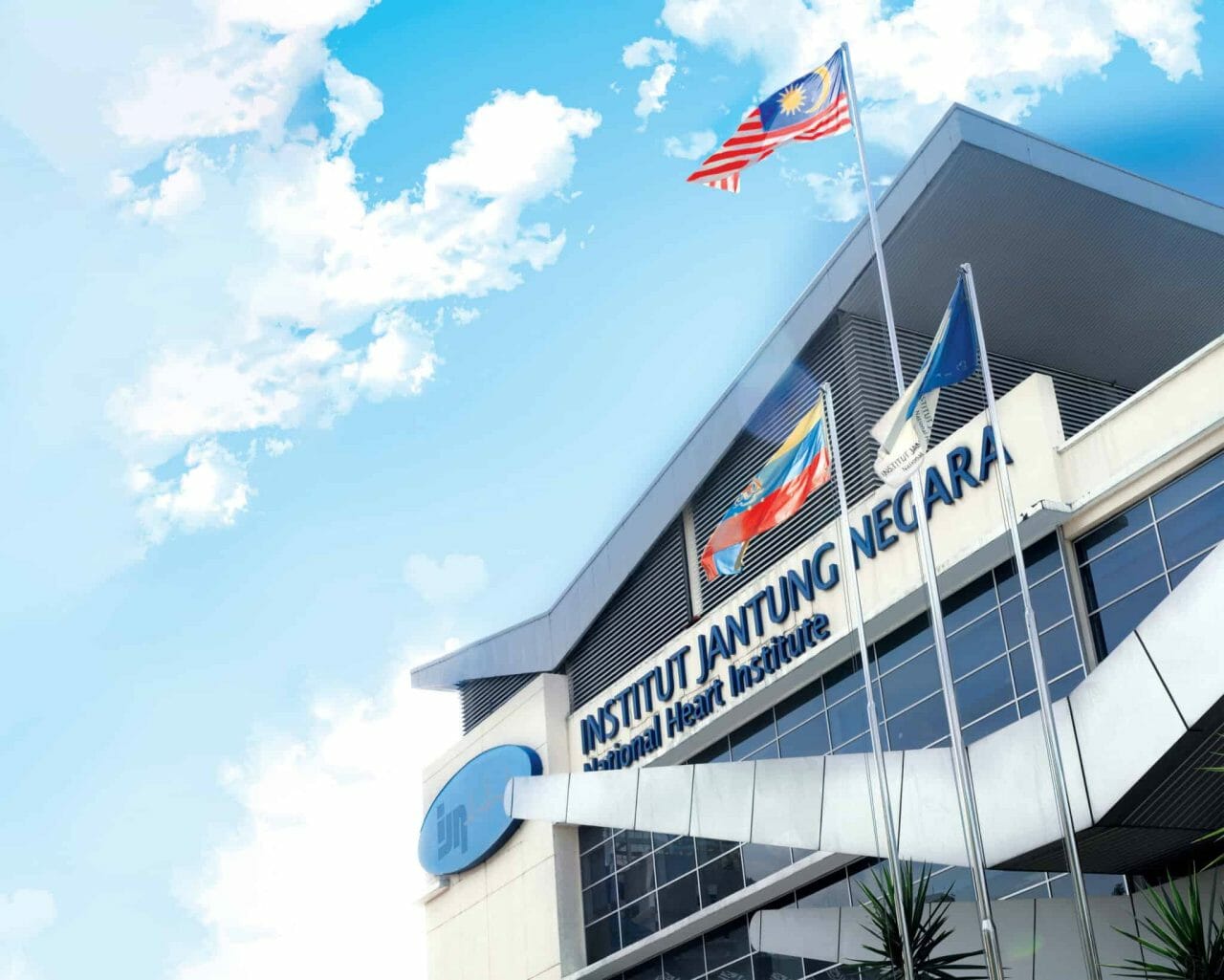Institut Jantung Negara (IJN), the nation’s top Cardiovascular and Thoracic Centre has treated close to 5 million patients and this number rises daily. Set idyllically along Jalan Tun Razak, the 30-year-old landmark is set on a course of expansion to serve the nation as well as those from other countries with its stellar track record.
Formally established on September 2nd, 1992, IJN has grown to be a worldwide leader in cardiovascular and thoracic care. The centre was championed by Malaysia’s then-Prime Minister Tun Dr Mahathir Mohamad, after local specialists successfully performed a heart bypass surgery on him.
Throughout the years, the centre has become synonymous with high-quality heart care, advanced technology and expertise, as well as heart health advocacy.
The hospital now stands as a heart specialist institution which is truly committed in delivering advanced standards in cardiovascular and thoracic medicine for adult and paediatric heart patients.
Today, the iconic institute has treated over 5 million patients and is acknowledged as a highly reputed cardiac medical institution not only in Malaysian but also in the region.
BT: IJN has received many accreditations and awards, could you name a few leading ones?
Dr Aizai: Having accreditations, certifications and awards is a feather in our cap. The process takes into account the medical field being dynamic. Accreditations are done on a regular scheduled basis by unbiased global professional bodies which raises the bar each year in terms of the criteria used for assessment.
The best way to benchmark quality is through accreditation. IJN has surpassed many of these international benchmarks and endeavours to reach new heights for our services in future.
It’s about ensuring a customer (patient or family members) will receive the best, safest treatment possible.
The objective is to be holistically recognised as an institution that has high standards of clinical excellence supported by the same high standards for other related services.
Locally, we have the accreditation from the Malaysian Society for Quality in Health (MSQH) which we have had since 2005. In 2009, we embarked on our international accreditation from an organisation known as the Joint Commission International (JCI), based in the US which we also held continuously since that year.
This year, IJN was presented with 5 awards at the Global Health Asia Pacific Awards 2022 for Cardiology Service Provider of the year in Asia Pacific, Pediatric Cardiology Service Provider of the year, Emergency Care Service Provider of the year, Heart Transplant Service Provider of the year and Most Innovative Hospital of the year in Asia Pacific.
In August, IJN was the proud recipient of The BrandLaureate BestBrands Award 2022 as ‘The Nation’s Pride Brand of the Year Award’ in the field of Healthcare and Community Engagement.
Apart from accreditations for clinical services, we also want to benchmark other forms of our services, for example, we have the ISO certification for Information security management system, Medial laboratories and also have received acknowledgments for our CSR programmes, human resource management and the institute is Halal and HACCP certified in food safety to name but a few.
In addition, we have implemented and achieved highest Energy Management Gold Standard from ASEAN Energy Management Scheme.
BT: Heart disease is reported as the leading cause of death In Malaysia. As a doctor, what would your advice be for Malaysians who do not know that he or she has a heart condition, as a wide variety of symptoms can lead to the disease?
Dr Aizai: Our advice must be data driven. If we look at Malaysia’s National Health and Morbidity Statistics, we find that cardiovascular disease is the number one cause of death for those aged 40 and above. We know cardiovascular disease doesn’t happen overnight, it occurs slowly over time, so if the higher incidences happen for those 40 and above, the screening must start before the age of 40 ideally. Many screen too late. The data is important. A person should screen for the disease at the latest on his or her 40th birthday.
Many have asked me whether heart disease can be cured, well not in the true sense of the word but is treatable and one can modify the outcome, meaning decrease the severity of the disease by early detection, the success of recovery and treatment is far better. I would recommend every man or woman undergo a basic medical check-up at 40 to have a baseline, and if issues are found, intervention can be started quickly if needed.
The focus then is on lifestyle. Many studies showed that 70% to 80% of factors which contribute to heart disease are reversible. About 10% to 15% of the total cases maybe genetic in nature, and at present, there is not much doctors can do to deal with the genetic aspect at present but there’s a whole lot of treatment available to deal with environmental and lifestyle factors, which significantly impact the incidences of heart disease in Malaysia.
BT: One of the current challenges faced by the medical sector is on the issue of medication non-adherence, could you explain this please?
Dr Aizai: Non–adherence is a global problem. It leads to the cost effectiveness of treatment being greatly reduced. There are many ways to tackle it – there are governmental ways, society means and individual responsibility.
At IJN, we have dedicated cardiovascular risk reduction clinics, so when people come for our medical check-up programme, if they are found to have risk factors, we ask them to join our clinics at which time is spent with each individual to address issues despite time being precious for us.
From my own experience, if you want patients to comply to a doctor’s advice, you need to spend time with them. You need to be a good listener, talk and provide feedback.
IJN emphasises a personalised approach and we live by our logo – ‘Trust IJN’. We want to build that trust with a patient, only then will the patient understand what the doctor is doing for them.
We also use technology, there are many apps available in the market which reminds the patient when to take their medication, encourage and remind them to exercise. More importantly, when addressing the issue, you cannot rely solely on the patient, the family should be involved too.
Also, when one pays for treatment out of his or her own pocket, they tend to be more compliant since if they don’t comply, they are going to fall sick again and again. In a situation where there is access to subsidised treatment, sometime patients don’t value what
is being done but it is important for them to understand the costs involved so that they value the treatment given, otherwise it’s taken for granted.
Medication non–adherence refers to when a patient is not following their prescribed treatment plan. According to World Health Organization (WHO), almost half of patients with chronic diseases do not take their medications or treatments as prescribed – a figure that is estimated to be higher among those in developing countries.
Unused medication is also a financial wastage for the public health expenditure. This is why IJN is keen on looking for solutions that will benefit the Malaysian healthcare sector as a whole, as well as improve the wellbeing of Malaysians with chronic illnesses.
IJN, through a new collaboration with CaringUp Malaysia, has introduced a mobile app called Care Aide – a first of its kind compliance platform in Asia to help improve medication nonadherence. As medication adherence involves a behavioural change to address intentional and unintentional non-adherence, CareAide has been created with a feature to address such issues by allowing intervention by the family members.
BT: IJN has embarked on an increased push for healthcare digitalisation. What areas are involved and how does this help the institute as well as each patient?
Dr Aizai: We are keenly looking at healthcare digitalisation. The Covid-19 pandemic was unprecedented but it revealed the gaps in our current services and the need for technology and innovation to be applied in the medical field to enable us to continue attending to our patients medical and surgical needs despite challenging and evolving circumstances.
At the same time, we have to protect our patients, staff and maintain business continuity. We have to leverage on technology to remain connected and updated nowadays.
Our task is to be connected in terms of sharing information, for example we developed our own inhouse IJN Surveillance integrated digital platform which have submodules to automate tracking of vaccination status, covid status, contact tracing amongst our staff, patients, caregivers and visitors which made it easier to effectively manage our resources and for safety.
For this, IJN recently won the Excellence Award in Most Advanced Healthcare Technology category at the Asian Hospital Management Awards 2022.
We are now working on upgrading the hospital’s management system, dubbed Total Hospital Information System (THIS) which includes the Electronic Medical Records (EMR) system, which will contain the various components of our services.
The basis of treatment like the blood test results, imaging scan pictures and medication prescribed would be centralised through an app which is being developed where the information is kept private and confidential.
The app will enable our patients to communicate with us and this will empower them to access their own records at any time. Patients may also use the app for making or changing their appointments.
This is part of our efforts at a ‘total information system’ transformation, which basically entails utilising digital health solutions wherever possible to ease our processes as well as help our patient better manage their own health.
Digitalisation efforts will also support the government’s long-term goal of adopting the Fourth Industrial Revolution (4IR). IJN’s EMR system is slated to be launched sometime in late 2023. On top of that, the research department within IJN is developing our own digital databanks on cardiovascular diseases.
Over the past 30 years of treating patients, we have accumulated a huge amount of information on various cardiovascular diseases in Malaysia and these datasets can be analysed using Artificial Intelligence (AI) or Machine Learning (ML) tools which will enable us to optimise resources and improve patient care based on local requirements.
BT: IJN, treats ‘the affairs of the heart’ or predominantly cardiovascular disease or those related to it. Is IJN’s capacity sufficient? How is this addressed?
Dr Aizai: The medical professionals at IJN go through continuous upskilling, ‘Caring Beyond The Heart.’
We are also undergoing a physical expansion. Phase one is ongoing to build an additional multistorey carpark which is expected to be completed by mid-2023 and followed by phase two which is constructing an 11-storey clinical block which will add additional clinics, wards, ICU beds, operating theatres and invasive catheterisation laboratories to cater for new patients and enhancing patient experience.
We are already running specific clinics for prevention, like IJN’s cardiac rehabilitation, lifestyle and stop smoking clinics. This is a natural progression as prevention is the way forward as the cost of healthcare is rising. If IJN continues to focus only on high-end care, it may not be financially sustainable into the long term.
As a third-tier referral centre, we recognise heart disease does not occur in isolation, there are many patients with related risk factors of heart disease such as hypertension, diabetes, cholesterol, obesity, smoking, lack of physical activities and kidney disease.
Many patients we treat have multiple combinations of these issues and we will be introducing specific integrated disease management clinics to help these patients. At IJN, we have to address the underlying causes and to ensure that heart condition within a patient does not recur.
As we move along into the future, IJN’s success is to combine technology with expertise and soft skills to communicate the messages clearly to our patients and their families. they come from highly acclaimed universities to begin with and go through a multitude of training programs which ranges from ongoing courses to conferences and clinical attachments.
The same opportunity is also provided to our nurses and other allied health staff. For the institution to progress we need to accumulate knowledge and we believe in Continuous Medical Education (CME).
This is one way we ensure our doctors and clinical staff are up to date with the latest treatment methodologies.
We always work towards improving the quality of our services, not just the clinical aspect but quality carries a wide spectrum and is subjective. For example, we have set up a feedback system at the main lobby and outpatient clinics where patients and their families can express their issues via a QR code. The staff will attend to these issues promptly.
No doubt, we may have attained many accreditations and awards, but we need to hear what our patients or customers have to say in order to further improve our services further.
BT: IJN has contributed immensely to the health of the nation, what lies for IJN in the future?
Dr Aizai: The field of cardiology is constantly evolving and we have to not only develop the soft skills and human capital, but also in keeping with the latest innovation and technology in this field.
The advantage for IJN is the doctors here are highly trained from renowned centres, mostly from overseas.
From a cost perspective — especially in terms of currency exchange — our charges are seen as being value for money. The cost of treatment at IJN is more affordable than those provided at other centres in neighbouring countries.
It’s also important to note that the warmth and hospitality shown by those who provide treatment here, is always a plus in dealing with patients which is consistent with our other motto of ‘Caring Beyond The Heart.’
We are also undergoing a physical expansion. Phase one is ongoing to build an additional multistorey carpark which is expected to be completed by mid-2023 and followed by phase two which is constructing an 11-storey clinical block which will add additional clinics, wards, ICU beds, operating theatres and invasive catheterisation laboratories to cater for new patients and enhancing patient experience.
We are already running specific clinics for prevention, like IJN’s cardiac rehabilitation, lifestyle and stop smoking clinics. This is a natural progression as prevention is the way forward as the cost of healthcare is rising. If IJN continues to focus only on high-end care, it may not be financially sustainable into the long term.
As a third-tier referral centre, we recognise heart disease does not occur in isolation, there are many patients with related risk factors of heart disease such as hypertension, diabetes, cholesterol, obesity, smoking, lack of physical activities and kidney disease. Many patients we treat have multiple combinations of these issues and we will be introducing specific integrated disease management clinics to help these patients.
At IJN, we have to address the underlying causes and to ensure that heart condition within a patient does not recur.
As we move along into the future, IJN’s success is to combine technology with expertise and soft skills to communicate the messages clearly to our patients and their families.











